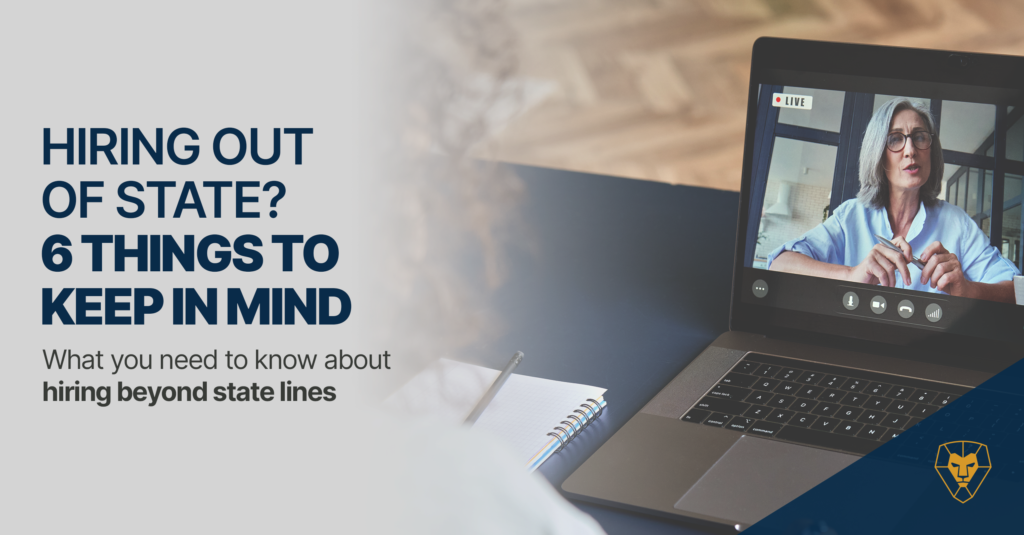Hiring Out of State? 6 Things to Keep in Mind
By: Marilyn Garcia, Manager of People and Culture
Making the shift to work from anywhere (WFA) can bring many benefits, including casting a wider net to hire talent across the country. You may be wondering about some of the tax and labor laws involved in employing people in other states, and other implications involved in that process.
At Liongard, we’re happy to share the path we’ve taken to successfully transfer to a WFA environment. We’ve had remote workers in different states (17 and counting) since we started, and we’re expanding all the time! Our philosophy has always been, unless having someone in-office is a must, why limit ourselves to only hiring locally?
In addition to hiring from a larger talent pool, we’ve also embraced work from anywhere because it offers our people the flexibility that’s essential for work-life balance. That was our “why.” Your “why,” your purpose, may be different, but the first step is to figure out what you’re trying to solve with a WFA model.
Once you’re set on becoming a WFA company, it’s important to have a plan and be ready to support it from Day 1. That means human resources, cybersecurity, office setups, keeping the culture and making time for engagement.
The Scoop on Hiring Out-of-State
As you make the move to WFA, your MSP should already be taking the necessary steps to address the following:
Staying up to date on labor laws and tax legislation. Some states, like California and New York, have very specific laws you’ll need to keep an eye on. For example, California offers a very generous family leave policy that you’ll want to know about. Additionally, regulations and laws aren’t set in stone—they can and often do change yearly. You can find an up-to-date list of state-based labor laws on the Department of Labor website.
Filling in your knowledge gaps. Your HR team can sign up to get alerts and updates on labor and tax laws, but if they don’t have the bandwidth to stay on top of these issues, a third-party service can provide supplemental expertise and help you make the necessary adjustments. At Liongard, we work with a third-party recruiter and a human resources company to help us manage our employees. HR companies and professional employer organizations (PEOs) have a full suite of services and specialists in all areas of human resources including employment law, workers’ compensation, employee tax, payroll, etc. These services help augment our own human resource experts. Because we’re not hiring out-of-state employees on a day-to-day basis, this à la carte solution works perfectly for us and successfully fills in our state-to-state knowledge gaps.
Defining employment status. Though you may want to treat your team members the same regardless of their employment status, it’s important to clearly define the differences between a contractor and a full-time employee. This includes access privileges, benefits and the scope of each role, to protect all parties involved.
Factoring in cost of living. Talent in major cities with high costs of living, like Seattle or New York City, will be more expensive than hiring talent in Houston or San Antonio. Consider the value they’ll deliver and what they will bring to the role to balance it out.
Helping candidates understand specific requirements. Notices, training, certifications and benefits vary by state, and sometimes employees don’t know this. You can help avoid misunderstandings, regrets and turnover if you can disclose how employment with your MSP may affect them and what is required from the get go.
Making sure candidates want to work remotely. Both parties should think through the expectations for person-to-person collaboration. Your hiring manager should address your company culture and approach to engagement during the interview process, and candidates should consider whether they’re truly comfortable with remote teamwork before committing to the role.
Remote-First Benefits
Since our team shifted to the work from anywhere model, we’ve experienced a number of benefits that on-site work can’t always deliver:
Win-win customer service. We have Partners all across the U.S., so having remote team members in different times zones means service is available when our clients need it, without our team having to work early mornings or late nights.
Access to the best talent. When the position you’re hiring for can work from anywhere, you can hire from anywhere. You’re no longer bound by your local talent pool, and candidates don’t need to pack up their lives and move if they accept your job offer.
Lower office expenses. Though you’ll still need to provide your team with equipment, supplies, office furniture and other items, you won’t have the high overhead of paying for an on-site workspace for each employee. This makes WFA especially attractive for a growth-focused companies.
Less turnover. When people have a comfortable work environment and the flexibility to work around life (instead of the other way around), they do their best work. Add to that the time- and money-savings of eliminating the daily commute, and the reasons to leave such a great situation diminish quickly.
All indications point to WFA being here to stay. Now is the time to embrace it, prepare for it, implement it successfully, and help your customers do the same.
The post Hiring Out of State? 6 Things to Keep in Mind appeared first on Liongard.
